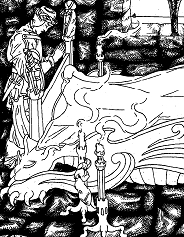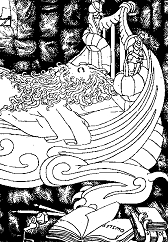

| - | - | - | - | - |
| Dragon | - | Classes (Bards) | - | Dragon #60 |
Many long years ago, there was a man
named Diarmuid, who was the greatest
of all bards of his time. In his day he had
told many a jest, sung many a lay, drunk
many a cup of golden ale, and lightened
many a heart. Indeed, he was known
throughout all the lands he traveled as
the best of companions, a hearty man
with a great laugh like thunder rolling
down from the hills. He was gracious to
prince and thrall alike, and his life was
long and merry. So he came to be much
loved by all who knew him, and as he lay
finally on his deathbed, the town of his
residency mourned. The Archdruid and
the local Lord had come to be with the
great Magnus Alumnus at his passing,
and drink his grave ale. A fitting gravity
settled over all the countryside.
Fitting, that is, to all but Diarmuid himself. Perhaps he thought it poor
form to
have lightened hearts all his life, only to
weigh them down at his end. Perhaps he
feared to slip away into death and be
forgotten, and wished to do one last
great deed before he died, to make his
name live on. Or perhaps the lively sense
of humor that he applied to all things just
couldn’t be suppressed, even on this occasion of solemn gravity. In
any event,
he had thought of one last jest to tell, and
he meant to crack his joke before he
died.
“Quick, lad,” he croaked to his apprentice, a young bard named Fergus.
“Fetch me a stoup of wine, and bring the
Archdruid and the Prince and their companies. There is one last jest
in this old
fool, and I’ll tell it, ‘ere Arawn
takes my
soul to Caer Sidi. There’s no more jesting in that grey land.”
Fergus looked askance at his master,
but a dying man’s request is courtesy’s
command, so off the young bard went to
fetch the lords. And they came: Prince
Bras, a heavy man, cruel to his thralls,
cruel to his women, cruel to his beasts;
the Archdruid with his long fade, very
much at home among wailing women
and ponderous thoughts, enjoying the
solemnity of the occasion like a tonic;
the Lady Meave, who saw no charm in
anything but herself; and all their chief
Servitors. Not a single peasant was allowed to enter the room — “Not
that I
thought they would be,” muttered Diarmuid to himself as the guests
entered.
The Archdruid cleared his throat and
made a speech to which all listened respectfully except for the dying
man, who
motioned Fergus to bring him the wine.
He then sipped his wine all through
Bras’s curt farewell and Meave’s weepy
one, during which she somehow managed to get her terribly expensive
hatfeather in his wine. He noticed. So did
everyone else. She was pleased.
“A very nice plume, my chick,” said he,
raising himself up slowly to stand on the
floor. “But I’ve called you together to
hear old Diarmuid’s last jest, for I’d not
leave the folk mirthless, nor did I wish to
die alone.” His voice grew stronger as he
began his tale, “Once there was a traveling merchant,” he said, “who
stopped at
a simple crofter’s farmhouse.”
For several minutes he held them enthralled by his skill once again, and
then
he came to the punch line. At once, Bras
let out a hearty guffaw, and the Lady
Meave blushed and began to titter. The
Archdruid, despite his best efforts to
control himself, held his stomach and
howled. The entire company bit their
lips, slapped their sides, rolled on the
flags and rushes, choking with helpless
laughter that drifted out into the somber
town. Those who heard wondered at the
strange sound.
Soon the laughter, having reached its
height, was stilled. Fergus wiped his
eyes, and looked about the room. Suddenly, his mouth dropped open in
horror. All the great lords and ladies were
dead! Only he was left alive — he and
Diarmuid, who now lay on the bed once
more, obviously spent and sinking.
“Fergus,” whispered the old man. As
Fergus knelt to hear his master’s last
words, the old bard said, “Stand the
common folk a round of drinks out of my
Lord’s purse, over there. I said I’d not
leave the folk mirthless, nor did I wish to
die alone.” He smiled a weak smile and
said, “Such sour companions as these
are fitting for Arawn’s hall, and maybe
even he will find this amusing.” And then
he was gone
.
So, Diarmuid’s Last Jest was heard by
no one living but Fergus, who remembered it, and passed it on to his
apprentice.
And to this day, Diarmuid’s Last Jest
is a byword among the common folk,
who revere his name as the greatest of all
bards who ever lived.
Diarmuid’s Last Jest is perhaps the
most powerful of all bardic special abilities. When told properly by
a trained
bard, it has the awesome ability to make
its hearers literally die laughing. To tell
the Jest takes 5 rounds. The bard’s
hands must be free, and he must be unencumbered. The speaker must converse
freely in the hearers’ native tongue
for the Jest to have its full effect; telling it
in a tongue not native to the hearers
Jest — not even as a bonus on the saving
throw.
When the bard rolls his charm percentage or lower and the hearer fails
his
saving throw, the hearer is helpless with
laughter and will die within 7-10 (d4+6)
rounds.
If the hearer makes his saving throw,
the hearer is helpless with laughter for
7-16 (d10+6) rounds, and weak (-2 “to
hit”) for 2-8 (2d4) rounds thereafter.
When the bard rolls more than his
charm percentage and the hearer fails
his saving throw, the hearer laughs for
1-6 rounds. Reaction dice are at +25%,
during this time, and the hearer is able to
react fully to any situation,
but is susceptible to automatic surprise during the
first 1-3 rounds of laughing.
If the hearer makes his saving throw,
the hearer is angered and/or scornful,
his reaction rolls are modified downward
25%, and the hearer is wary and cautious
(no automatic surprise possible).
Modifiers to the hearers’ saving throws
are as follows:
* Bard fails charm percentage roll: +2
* Hearer’s intelligence Low: +1
* Hearer’s intelligence High or better: -2
(More intelligent hearers can pick
up on more Subtleties than a comparatively simple
hearer can.)
* Jest told in tongue understood by, but
not native to, hearers: +3 on save, maximum effect
not possible.
At the DM’s option, large groups (e.g.,
a bunch of orcs, roaring drunk, and looking for entertainment at their
captive’s
expense) may be given a mass saving
throw. Bards are immune to the effects of the
Jest, as are leprechauns, whose reaction
to the teller will rise 50% upon hearing
the Jest properly told. All other joke-telling beings are liable to
it, with the
following exceptions and special cases:
* Sphinxes save at -2
* Certain intelligent undead might
be subject to the Jest (DM’s option), but get a
+5 on their saving
throw.
* Some common-speaking dragons may be terribly amused
by the
Jest, but they will not be helpless
with laughter (though they may be
surprised).
* Non-intelligent animals, and beings from the outer
planes, are not
affected — not that they don’t have
a sense of humor, but it doesn’t
dance to the same tune.
The Jest is an oral tradition; it will never be found written down.
A bard gets one chance to learn (and
subsequently use) the Jest upon attaining each new level of
experience beyond
the first level. It can only be used once
while the bard occupies a particular
experience level, except for 23rd-level
bards, who can learn and use the Jest
once per month. To learn the Jest, the
bard must roll his legend lore percentage. He can also learn it from
another
bard who knows it, but the price for sharing such a professional secret
would be
very stiff — a major magical item plus
cash, plus a favor or three, to say the
least.
The Jest is very intricate and full of
nuances, and cannot just be rattled off. If
the bard attempts it more than once before going up a level, he must
roll for his
charm percentage five times (once per
round of telling), or he blows the joke,
and in any event the hearers get an extra
+2 on their saving throws in addition to
any other modifiers that may apply.
Interrupting the Jestwhile it is being
told blows the whole deal, whether the
bard or someone else is the interrupter.
Under most conditions, a bard can get
even a rowdy crowd under control, so
the DM should not be too finicky about
hecklers, noise, or acoustics interfering
with hearing the entire Jest.A good bard
can take these conditions and turn them
to his advantage. Besides, laughter is infectious — so what if you
missed a line
here or there? But someone who cannot
hear at least a part of the bard’s performance will not be affected
by the Jest.
Remember the motto of Fergus, pupil
of the grand old Diarmuid himself: He
who laughs last, laughs longest